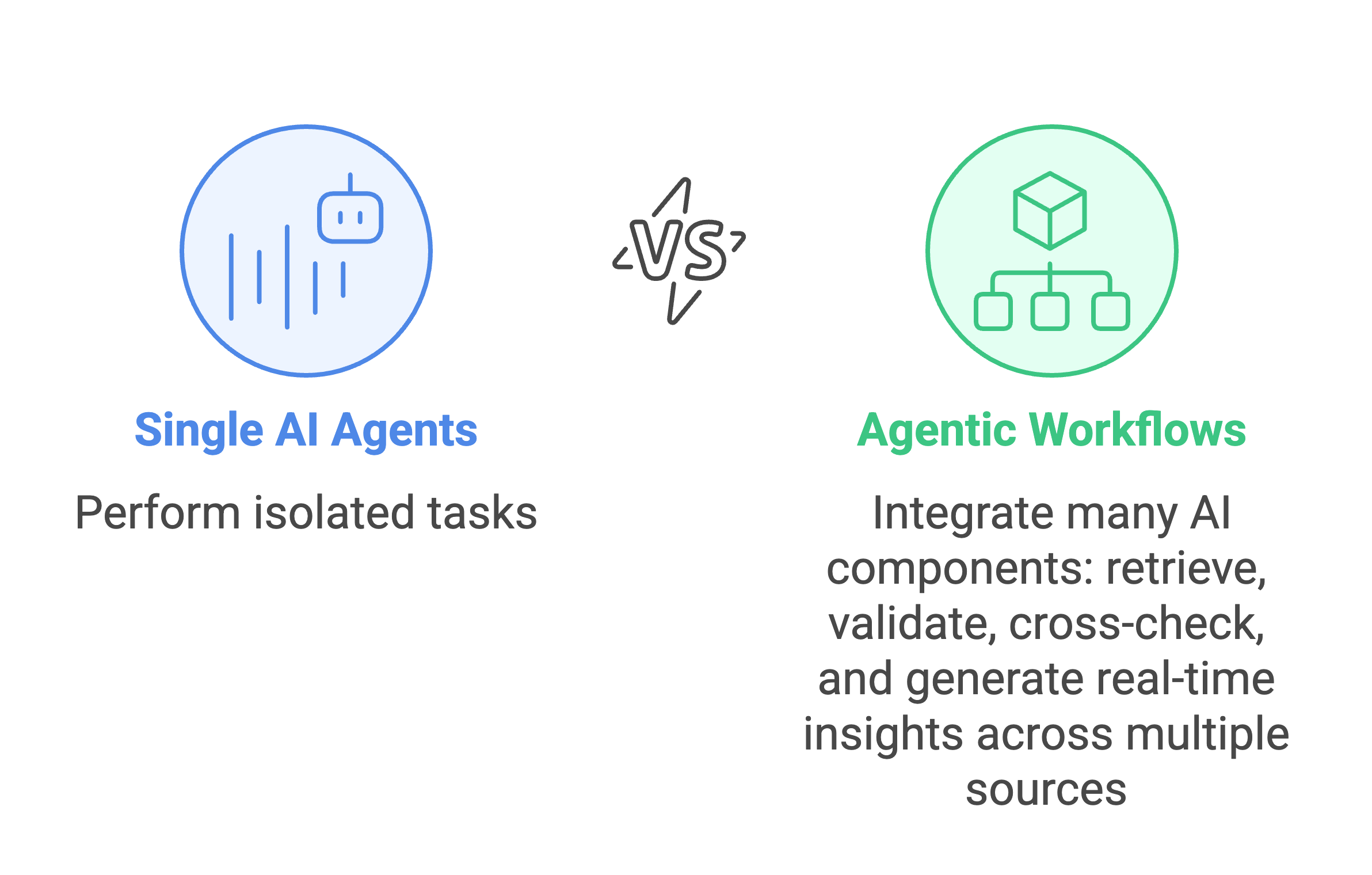Evals: The Missing Link in AI Trust and Automation at Scale
AI agents have been making headlines, promising to revolutionize knowledge work—from research and financial analysis to regulatory compliance and risk management. The idea is simple: give an AI agent a task, and it will autonomously execute it, retrieving data, summarizing reports, or even generating recommendations.
But single AI agents are not the same as agentic workflows. While a standalone AI agent can perform isolated tasks, agentic workflows are designed to integrate multiple AI-driven components into a systematic, repeatable process that mirrors human decision-making.
A single AI agent might retrieve financial reports, while an agentic workflow can retrieve, validate, cross-check, and generate real-time insights across multiple sources—ensuring consistency, accuracy, and auditability.
This distinction is crucial because business automation isn’t just about completing a single task—it’s about transforming entire workflows.
But with more complexity comes a pressing question: how do we trust these workflows to operate correctly and reliably?
This is where Evals come in—not as an afterthought, but as the foundation of AI-driven business transformation.
What Are Evals, and Why Are They Essential?
Evals (short for evaluations) provide a structured way to measure and refine AI-driven workflows. Unlike static rule-based automation, agentic workflows evolve over time, meaning they require continuous validation to ensure they’re delivering accurate, high-value results.
Think of it like quality assurance for AI workflows—but instead of manual spot-checks, Evals create an ongoing feedback loop where human experts and AI systems collaborate to refine automation performance.
Without Evals, Agentic Workflows Risk Becoming Black Boxes
Without structured evaluations, AI workflows can drift—introducing small but compounding errors that ultimately reduce trust. The most effective organizations aren’t just deploying AI; they are actively shaping how it learns and improves over time.
A strong Eval process allows teams to:
✅ Ensure accuracy: Verify that AI outputs align with expert expectations.
✅ Identify edge cases: Catch nuances that AI might miss without domain knowledge.
✅ Refine automation: Adapt workflows to evolving data and regulatory requirements.
This human-in-the-loop approach to eval creation transforms AI from a static tool into an adaptive collaborator, capable of scaling expert decision-making while maintaining transparency and control.
How Evals Enable AI Knowledge Transfer
In traditional automation, rules and logic are pre-programmed by engineers. But expert-driven tasks don’t fit neatly into predefined rules—they require judgment, contextual understanding, and experience.
That’s why at Transformica AI, we emphasize iterative knowledge transfer as a critical part of our Eval creation process. Instead of automating blindly, we work alongside experts to:
1️⃣ Capture how decisions are made today – Understanding the criteria, edge cases, and nuances that drive expert decisions.
2️⃣ Build an initial agentic workflow – Translating expert knowledge into a structured AI-driven process.
3️⃣ Refine through iteration – Using Evals to compare AI outputs against expert judgment and adjust accordingly.
This iterative process ensures that automation isn’t just fast—it’s trusted, accurate, and continuously improving.
From Rigid Automation to AI-Augmented Expertise
For decades, businesses have been forced to adapt to rigid automation—where software dictates how workflows should run. Agentic workflows flip this dynamic, allowing AI to adapt to expert-driven processes rather than the other way around.
The key to making this shift work at scale is trust—and trust requires Evals.
Companies that embed evaluation frameworks into their AI-driven workflows will gain a massive competitive edge, scaling expertise, reducing operational costs, and unlocking entirely new business models.
This isn’t just about automating work—it’s about creating AI-native organizations where human expertise and AI automation operate seamlessly together.
🚀 Are you thinking about how AI will impact your industry? We’d love to hear your perspective.



